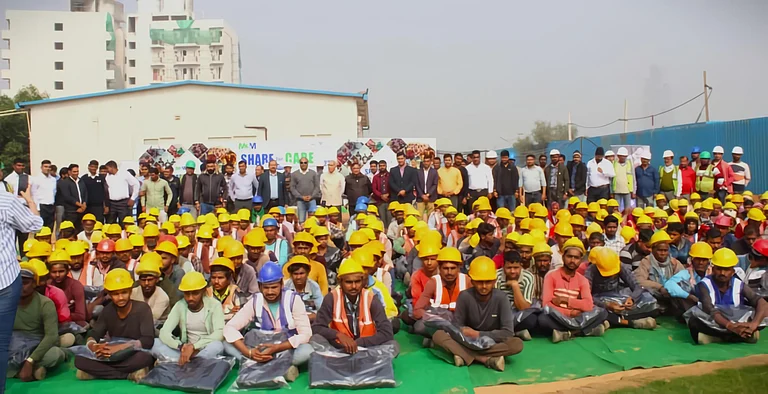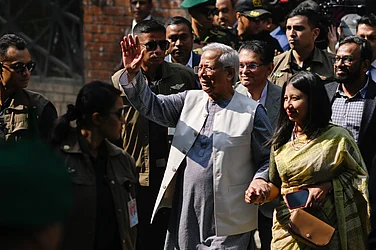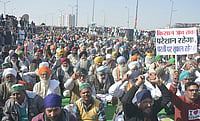In the latest sign of rising anger in China over Xi Jinping's 'Zero Covid' policy, Chinese have turned a Bappi Lahiri song into their protest anthem.
Chinese social media is full of clips with "Jimmy Jimmy Aaja Aaja" song by Bappi Lahiri from 1982 film Disco Dancer. It has become a tool to express their anger and frustration over the country's stringent 'Zero Covid' policy.
Under the 'Zero Covid' policy, lockdowns are imposed and entire towns and cities are locked up over few Covid-19 infections. The idea behind is to prevent people's movement and keep the infections and transmission to as close to zero as possible. It has put Chinese people and economy under great strain as their access to market and even essential healthcare access is cut.
Moreover, under the 'Zero Covid' policy, frequent and mandatory testing of millions is implemented which puts civil liberties, economy, and healthcare infrastructure under strain.
'Jimmy Jimmy' a protest anthem
In the Chinese social media networks Douyin, the Chinese name for TikTok, the "Jimmy Jimmy" song is sung in Mandarin as "Jie mi, jie mi", which translates into "Give me rice, give me rice". Clips with the song show people mockingly showing empty vessels to show how they are deprived of essential food items during the lockdowns.
The video has so far managed to escape Chinese censors that are quick to remove any post deemed critical of the country's regime.
Indian movies have always enjoyed huge popularity in China, starting from the days of cinema legend Raj Kapoor in 1950-60s to the recent years when films such as 3 Idiots, Secret Superstar, Hindi Medium, Dangal, and Andhadhun performed exceptionally well at the Chinese box office.
Observers say Chinese have found a smart way of using "Jie mi, jie mi" to make soft protests in their bid to highlight the public plight over the 'Zero Covid' policy, which has literally cut off China from the outside world.
China has been bogged down with zero-COVID policy under which dozens of cities, including Shanghai which has a population over 25 million, were under lockdown for weeks with people confined to their flats. Scores of videos have surfaced in which security officials can be seen severely cracking down on people protesting the lockdowns.
On Sunday, China reported 2,675 cases, up from 802 from the previous day.
Continued protests against 'Zero Covid'
The "Jimmy Jimmy" protest videos are the latest expression of public anger against Xi's 'Zero Covid' policies.
Earlier this month, in an extremely rare act of public defiance of Chinese government, banners appeared in capital Beijing which called Xi a "tyrant" and "dictator" and called the public "slaves" being locked by the government.
A translation by CNN journalist Selina Wang of some of the slogans read as "Go on strike. Remove dictator and national traitor Xi Jinping" and "Say no to covid test, yes to food. No to lockdown, yes to freedom".
Explaing the "extraordinary" nature of banners, journalist Bill Birtles tweeted: "Extraordinary given pre-Congress security plus surveillance...Extraordinary given the politics and security just out from the Congress...Such a small protest elsewhere wouldn't be worth so much attention but in Beijing. If anything the other banner is all the more daring in pre-Congress Beijing, calling Xi Jinping a dictator and calling for strikes."
This week, there have been reports of Chinese technology sector workers escaping an iPhone factory over 'Zero Covid' rules.
Chinese workers escaping Apple factory
A large number of workers jumped fences at Foxconn's assembly site for Apple iPhone in Zhengzhou city to escape China's 'Zero Covid' rules.
Foxconn is a Taiwanese company which manufactures Apple iPhones. The Zhengzhou factory is the largest in the world with around 2,00,000 workers. Workers at the factory premises are reportedly being held in quarantine after some of them tested positive. As a result, desperate workers are jumping fences and walking hundreds of kilometres to their hometowns.
Footage of such escapes and long walks home have surfaced on the internet.
There have also been reports that these workers are being denined transport services and are therefore forced to walk hundreds of kilometres.
"Abandoned by both employer and local government after a Covid-19 outbreak in Foxconn factory site, workers are not allowed to take any public transport but walk home," reported The Great Translation Movement.
Economic impact of 'Zero Covid' policy
The Chinese economy is being battered by 'Zero Covid' policy as economic activities, particularly in the manufacturing sector, come to a standstill whenever lockdowns are imposed.
China's industrial hub Shanghai was under strict lockdowns for several weeks this year, which brought economic activity to the halt and also affected international supply chains as Chinese manufacturing sector is critical to world economy.
The 'Zero Covid' policy is also putting a strain on the Chinese economy, according to think tank reports.
"In March, an estimated 345 million people across 46 cities were in full or partial lockdowns, a population accounting for 40 per cent of GDP," said the Center for Strategic and International Studies (CSIS) in a report.
Economists warn that China needs to boost growth that sank to 2.5 per cent over a year earlier in the first half of 2022, less than half the official annual target of 5.5 per cent, after Shanghai and other industrial centers shut down starting in late March to fight virus outbreaks.
“China's economy is at risk of stalling" due to the “impact of epidemic prevention and control policies", said think tank Anbound Research Center.
The CSIS report cited above noted that mass testing, part of the Zero Covid policy, also comes at a huge financial cost — as much as 1.5 of China's GDP.
"While the Chinese leadership believes that massively expanded mass testing will identify infections early and trigger measures to contain the outbreak without causing harmful disruption to the economy, it is still too early to know whether that approach will succeed. One thing is known: testing at this scale costs tens of billions of dollars, which may amount to 1.5 per cent or higher of China’s GDP," reported CSIS.
(With PTI inputs)


























